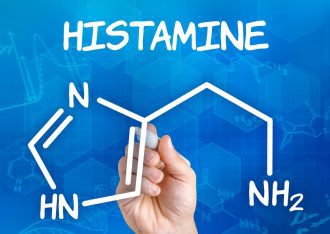Contributing writer for Wake Up World
After a holiday season filled with chocolate, copious red wine and even a christmas cookie or two, I was slammed with a series of migraine headaches — while also enduring ongoing nausea, depression and extreme fatigue for several days. The aftermath shouldn’t have come as any great shock, especially since I’ve known for years the effect these types of foods can have on my overall well-being. What might be surprising is the reason why: histamine.
Histamine in and of itself isn’t bad. It’s when we’re overloaded with this naturally occurring chemical that we can run into trouble. You may have heard of histamine in relation to allergies, mainly because it plays a key role in triggering an inflammatory response to pollen, mold or food. It’s the body’s way of defending itself against a perceived “invader.” But when the response goes haywire, or we take in too much through food and drink, it can cause severe symptoms — from hives and rashes, to headaches, depression and schizophrenia. The good news is that it’s possible to ease the sensitivity through diet and lifestyle choices, so that we can enjoy greater emotional and physical health.
Fundamentals of Histamine Intolerance
Basically, histamines are chemicals produced during an immune response. They are also found in food and drink. When histamines are released by the body, a cascade of biochemical reactions occur. Blood vessels swell and dilate, while mast cells (a type of white blood cell) zero-in and attack the invader. The subsequent inflammation of itchy eyes, angry rash and swelling are all thanks to the compound. Normally, the reaction is short-lived and subsides quickly once the threat is overcome. But when the system is exposed to an overabundance of histamine — either with ingestion of high-histamine foods or through excessive production by the body and/or gut bacteria — an intolerance can develop. In turn, a host of unpleasant side-effects can ensue, such as:
- Asthma
- Headache/migraine
- Insomnia
- Hypertension or hypotension
- Dizziness
- Arrhythmia
- Difficulty regulating body temperature
- Anxiety
- Aggression
- Nausea and vomiting
- Flushing
- Abdominal cramps
- Constipation
- Diarrhea
- Flatulence
- Irregular menstrual cycle
- Hives
- Fatigue
- Tissue swelling
- Mood swings
- Digestive disorders
- Premenstrual syndrome
Oftentimes, those with a histamine intolerance also have compromised histamine degradation because of reduced diamine oxidase (DAO) activity — which can be caused by a genetic predisposition or through ingestion of DAO blocking foods like alcohol, black tea, energy drinks and green tea.
Interestingly, this study found that “histamine intolerance seems to be acquired mostly through the impairment of DAO activity caused by gastrointestinal diseases or through the inhibition of DAO.” The researchers discovered that those who suffer from inflammatory and neoplastic gastrointestinal diseases, such as food allergy, gluten-sensitive enteropathy, Crohn’s disease, ulcerative colitis, and colon adenoma, tend to have a genetic predisposition toward elevated histamine and diminished DAO activities, resulting in reduced histamine metabolism.
Eighty-percent of those who suffer from the disorder are middle-aged. It’s estimated that one-percent of the population has a histamine intolerance, but the research team believes the numbers could be much higher since symptoms are frequently misinterpreted or unrecognized.
Moreover, people with high levels of histamine often suffer from obsessions, compulsions, phobias, drug, alcohol or sugar addictions, deep depression and suicidal thoughts. High-histamine individuals are prone to:
- Cry easily
- Hear the pulse in their head when they lay down to sleep
- Itch frequently
- Suffer from seasonal allergies
- Have a low pain threshold
- Sleep lightly
- Episodes of “blank mind”
- High body temperatures and fast metabolism
How to Reduce Histamine Reactions
If you think you may have a histamine intolerance, the first step is to make a few dietary adjustments. Remove high-histamine foods for at least four weeks to see if there’s an improvement in symptoms. Amanda Geary, founder of The Food and Mood Project, has put together the following list based on the histamine-restricted died used at the Allergy Nutrition Clinic, Vancouver Hospital, Canada.
Foods to avoid:
- All fish and shellfish (unless caught, gutted and cooked within 30 minutes).
- Processed, smoked and fermented meats.
- Cheese, yoghurt, buttermilk and kefir.
- Avocados, apricots, bananas, cranberries, cherries, citrus fruits (oranges, lemons, limes, grapefruit), currants, dates, loganberries, pineapple, prunes, raisins, raspberries, strawberries.
- Aubergine (eggplant), avocados, olives, pumpkin, red beans, soy and soy products, fermented foods, spinach, tomatoes, tomato sauces, ketchup, seasonings, anise, cinnamon, cloves, chili powder, curry powder, nutmeg, pickles, relishes, sauerkraut and other foods containing vinegar.
- Tea (black/ green), chocolate, cocoa, cola, alcoholic and ‘de-alcoholised’ drinks (red wine is particularly high in histamine).
- Foods containing yeast (brewer’s, baker’s or nutritional).
- Colorings such as tartrazine (E102), preservatives such as sulfites, benzoate’s, BHA and BHT.
- A small amount of eggs may be tolerated in baked products.
The Food and Mood Project also recommends the following:
- Avoid eating overripe fruits and vegetables as histamine levels rise as these foods ripen.
- Throw out the left-overs in the fridge and ensure your food is as fresh as possible, as histamine is formed from the bacterial action that takes place as food starts to rot.
- Take steps, such as increasing water intake, to prevent constipation. Food can start to ferment in the gut and add to the histamine burden in the body.
- Cut down on additives that, although they don’t contain histamine themselves, can contribute to histamine being released in the body and lead to a ‘pseudo-allergic reaction’.
- Focus on foods high in the bioflavonoid luteolin, which helps to reduce inflammation and curb histamine reactions. Parsley, artichokes, celery, olive oil, rosemary, peppermint, sage and thyme are all good sources.
Additionally, take 2000mg of vitamin C per day, since it has natural antihistamine properties. You can also supplement with DAO if you feel you need extra support in reducing histamine levels. Make sure to keep stress down as well, since it triggers histamine production. Women are more prone to histamine overload during menstration and the following week, so it’s especially important to watch the diet during this time. For further tips on low-histamine living, see here.
Article sources
- www.ajcn.nutrition.org/content/85/5/1185.long
- www.foodsmatter.com/allergy_intolerance/histamine/articles/histamine.html
- www.histame.com/histamine-rich-foods-substances
About the author:
 Carolanne Wright enthusiastically believes if we want to see change in the world, we need to be the change. As a nutritionist, natural foods chef and wellness coach, Carolanne has encouraged others to embrace a healthy lifestyle of organic living, gratefulness and joyful orientation for over 13 years.
Carolanne Wright enthusiastically believes if we want to see change in the world, we need to be the change. As a nutritionist, natural foods chef and wellness coach, Carolanne has encouraged others to embrace a healthy lifestyle of organic living, gratefulness and joyful orientation for over 13 years.
Through her website Thrive-Living.net, she looks forward to connecting with other like-minded people from around the world who share a similar vision. You can also follow Carolanne on Facebook, Twitter and Pinterest.
Recommended articles by Carolanne Wright:
- Renowned Harvard Psychologist Says ADHD is Largely a Fraud
- Antibiotics Shown to Impair Memory, Stop Growth of New Brain Cells
- Plastic Waste in the Ocean Will Outnumber Fish by 2050
- Mind Control, Subliminal Messages and the Brainwashing of America
- Plastic-Eating Mushroom Discovered in the Amazon Rainforest — A Solution for Our Trash Saturated World?
- Over 100 Scientific Studies Agree: Cannabis Annihilates Cancer
- Why Every Parent Should Consider Unschooling
- First U.S. City Produces More Electricity Than It Uses — With 100% Renewable Technology
- If You Care About Animals and the Earth, Here’s Why You Need to Boycott Palm Oil Immediately
- Basic Income Guarantee: A Surprisingly Cost-Effective Method for Eliminating Poverty
- Instead of Punishment, This School Teaches Mindfulness and Yoga — With Stunning Results
- How Expressing Gratitude Rewires Your Brain for the Better

If you've ever found value in our articles, we'd greatly appreciate your support by purchasing Mindful Meditation Techniques for Kids - A Practical Guide for Adults to Empower Kids with the Gift of Inner Peace and Resilience for Life.
In the spirit of mindfulness, we encourage you to choose the paperback version. Delve into its pages away from screen glare and notifications, allowing yourself to fully immerse in the transformative practices within. The physical book enriches the learning process and serves as a tangible commitment to mindfulness, easily shared among family and friends.
Over the past few years, Wake Up World has faced significant online censorship, impacting our financial ability to stay online. Instead of soliciting donations, we're exploring win-win solutions with our readers to remain financially viable. Moving into book publishing, we hope to secure ongoing funds to continue our mission. With over 8,500 articles published in the past 13 years, we are committed to keeping our content free and accessible to everyone, without resorting to a paywall.








